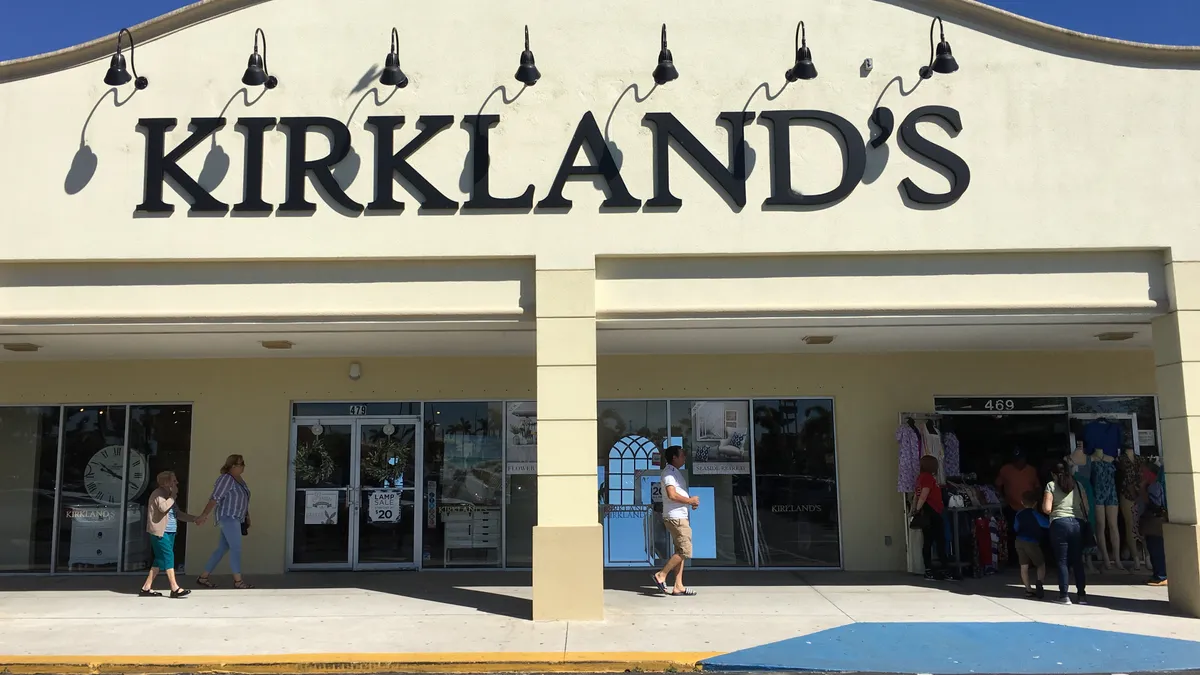Dive Brief:
- Following the completion of its deal with Beyond Inc. earlier this year, Kirkland’s announced fourth-quarter net sales dropped about 10% year over year to $148.9 million, according to a company press release Thursday. The decrease mostly stemmed from a 4% drop in store count, a decline in e-commerce sales and an extra week in the previous year’s quarter.
- The home retailer’s net income for the quarter fell about 22% to $7.9 million while operating income dropped 14% to $9.2 million. For the full fiscal year, Kirkland’s net sales decreased nearly 6% to $441.4 million and its net loss improved to $23.1 million from $27.8 million the year before.
- Kirkland’s also announced that it was in discussions to finalize an additional $5 million loan from Beyond as an expansion of its existing credit deal with the company. Expected to close this week, the new funds would be used for general purposes, including the “conversion of certain locations to Bed Bath & Beyond Home and Overstock stores.”
Dive Insight:
While dealing with tariff uncertainty and the potential impact on consumers, Kirkland’s leadership is focused on its work with Beyond Inc.
“We have identified the first of many potential store conversions under the Bed Bath & Beyond Home and Overstock banners that we believe will not only drive stronger brand awareness and customer acquisition but also support our ongoing transformation efforts,” Kirkland’s CEO Amy Sullivan said in a statement.
On an earnings call with investors, Sullivan revealed that Kirkland’s has identified a Nashville location as the first of several Bed Bath & Beyond Home conversions.
The home retailer entered into a strategic partnership with Beyond (which operates Bed Bath & Beyond, BuyBuy Baby and Overstock) in October that includes the opening of up to five neighborhood small-format Bed Bath & Beyond stores, for which Kirkland’s is the exclusive operator and licensee.
The deal additionally included the possibility of Bed Bath & Beyond shop-in-shops opening at Kirkland’s locations. Furthermore, the companies entered into a seven-year agreement that lets Beyond earn a 0.25% collaboration fee on all of Kirkland’s quarterly retail and e-commerce revenue.
The deal closed in February as a $25 million investment from Beyond, with Beyond owning 40% of Kirkland’s outstanding shares of common stock. The same month, Kirkland’s announced it would close about 6% of its stores as part of the larger turnaround effort.
Sullivan on the call emphasized that Bed Bath & Beyond Home stores will act as a sister brand to Kirkland’s, and have a differentiated assortment from Kirkland’s locations. The CEO added that the company projects dedicated Overstock stores will deliver at least two times the revenue of a current Kirkland’s store.
Kirkland’s isn’t the only other retailer that Beyond had been considering a strategic partnership with. Beyond had entered into an agreement to invest $40 million in The Container Store last year. However, the deal fell apart when The Container Store revealed that it didn’t expect to meet the agreed-upon financing conditions. The Container Store later filed for bankruptcy and emerged as a private company in January.
The deal comes amid other changes at Beyond, which announced last week that it would jump back into brick-and-mortar retail with its BuyBuy Baby banner just a few months after the brand had shuttered all its locations. The company also reported that its Q1 net sales dropped about 40% year over year to $231.7 million.














